11 Jul2019
By Roger Riddell and Naaz Modan
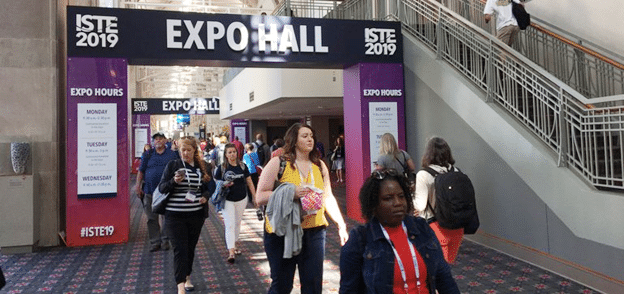
Credit: Roger Riddell/Education Dive
The following is an excerpt from an article originally published in Education Dive and is reprinted with permission. The article summarizes the 2019 annual International Society for Technology in Education (ISTE) conference in June.
Prepping new student teachers for digital learning
In a Monday morning session, ISTE Standards Senior Director Carolyn Sykora, ISTE Higher Education Recognition Program Lead Reviewer Sarah McPherson and the Fairfield University Graduate School of Education and Allied Professions’ Joshua Elliott detailed how ISTE is working with teacher preparation programs to recognize their quality and provide a simpler path to the ISTE Certification for Educators.
According to data from the U.S. Department of Education cited by Sykora, 146,000 graduate degrees in education were awarded in 2016, and there were 451,000 pre-service educators in 2014. The department also made a higher ed policy addendum to its National Education Technology Plan, to which Sykora noted there’s a lot of alignment between recommendations and the ISTE Standards for Educators and Students.
That’s noteworthy, given that a number of states—including Wisconsin, Michigan, Connecticut, Vermont, Texas, Washington, Delaware, Iowa, Utah, New York, Wyoming and Arkansas—and individual districts are adopting the standards.
09 Jul2019
By Brandon R.T. Frost
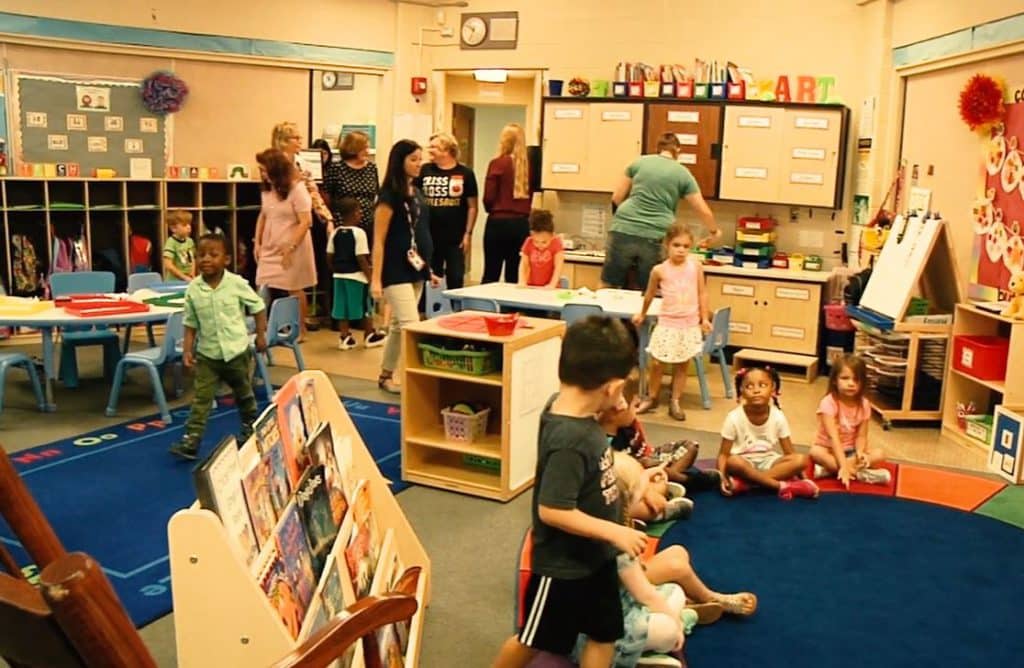
The Dual Licensure component of the Inclusive Early Childhood Program at Bowling Green State University (BGSU) supports teachers by improving their teaching craft and ensuring that teachers’ instructions remain relevant to their students.
Brenda Gift, the director of student services at Educational Services Center of Lake Erie West, applauds the program for providing high quality teachers who are eager to work in integrated classrooms. She further asserts that school districts are more likely to hire BGSU teacher candidates because of their dual licensure. Not only does the dual licensure indicate that teacher candidates can support all students, but it makes them marketable and competitive for hiring.
Some of the mentor teachers in partner school districts who support BGSU teacher candidates are BGSU alumni. Despite the responsibilities of being a classroom teacher, they value mentoring BGSU teacher candidates because they know how important it is to have an effective and supportive host teacher. The early childhood students benefit from teacher candidates because it provides a smaller teacher-to-student ratio. Teacher candidates agree that having proper training for inclusive education benefits them and the students they teach, assuring they are ready to instruct all learners once they enter the classroom.
To learn more, watch the What’s In It for Me? video highlighting BGSU’s Models of Inclusive Clinical Teacher Preparation, part of AACTE’s Research-to-Practice Spotlight Series.
09 Jul2019
By Michelle Buehl and Jane Vogler
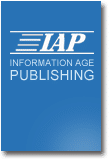 As co-editors, we are seeking chapter authors for a book we are publishing with IAP: Information Age Publishing titled Teaching Learning for Effective Instruction. The volume is part of the series, Theory to Practice: Educational Psychology for Teachers and Teaching, and it is scheduled to be released in early spring 2021.
As co-editors, we are seeking chapter authors for a book we are publishing with IAP: Information Age Publishing titled Teaching Learning for Effective Instruction. The volume is part of the series, Theory to Practice: Educational Psychology for Teachers and Teaching, and it is scheduled to be released in early spring 2021.
Education researchers and practitioners are invited to submit chapter proposals between 500-750 words by September 15, 2019. Chapters in this volume may include
- a review of the empirical research that supports the teaching of learning and cognition as it applies to P-12 settings;
- a description of instructional practices used in college courses that have been effective in teaching about and modeling principles of learning and cognition; or
- a systematic discussion of issues surrounding the teaching of learning and cognition theories, research, and classroom applications, with clear connections between the empirical literature and the instructional practices.
09 Jul2019
By Lynn M. Gangone
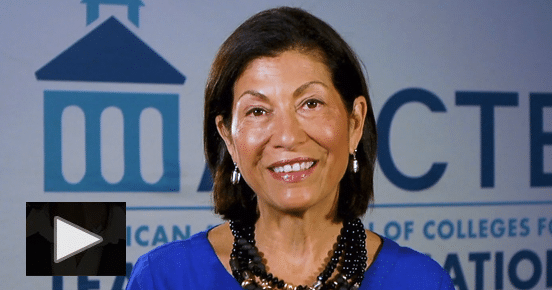 I am excited to report that the AACTE Board of Directors approved a new Strategic Plan framework during their meeting in Washington, DC last month. Our Board adopted new vision and mission statements that are bold, innovative, and will facilitate building the Association’s overall strategic plan. Please take a few minutes to watch the video above (or read the transcript) to learn more about your Association’s new direction.
I am excited to report that the AACTE Board of Directors approved a new Strategic Plan framework during their meeting in Washington, DC last month. Our Board adopted new vision and mission statements that are bold, innovative, and will facilitate building the Association’s overall strategic plan. Please take a few minutes to watch the video above (or read the transcript) to learn more about your Association’s new direction.
AACTE is committed to elevating education and educator preparation through research, professional practice, advocacy, and collaboration. Be a part of our exciting work by actively engaging in our efforts. Learn more about AACTE’s initiatives and how to get involved by visiting aacte.org.
01 Jul2019
By Jane E. West
This blog post is written by AACTE consultant Jane West and is intended to provide update information. The views expressed in this post do not necessarily reflect the views of AACTE.
Congress is headed out of town today for the week-long July 4 recess next week. Check your local July 4 parades and picnics—Members of Congress often show up there and it is a great time to connect with them!
What Can we Expect When Congress Returns July 8?
- Congressional Schedule
The Congress returns July 8 for about four weeks. Then they head into the August recess. They will be back for about four weeks in September. This equals about 27 legislative days left before the October 1 beginning of the FY 2020 fiscal year. Conventional wisdom holds that the closer we get to being all consumed by the next election, the less Congress will get done. Time is short, but there are always surprises!
- Appropriations
Once again, we may be facing a government shutdown in October. Before that time all 12 appropriations bills must be completed, and some action on the debt ceiling must be taken. (The debt ceiling is when the government is about to exceed its borrowing authority and thus, must increase the amount it can borrow, in order for the government to continue to function.) This is a tall order with only 27 legislative days.
- Higher Education Act
The Senate HELP Committee has been working for months on a bipartisan bill to reauthorize the Higher Education Act. Yet the long-awaited draft has yet to materialize. The big hold up appears to be how colleges and universities should respond to allegations of sexual assault on campus—a provision housed in Title IX of federal civil rights law. In fact, HELP Committee Chair Lamar Alexander (R-TN) and ranking member Patty Murray (D-WA) asked a bipartisan group of six senators to meet to try to resolve this issue.
What Should We be Watching in the Federal Agencies?
01 Jul2019
By Katrina Norfleet
AACTE board member Donald Easton-Brooks is widely known as a scholar of educational policy and culturally responsive teaching. This year, he released his book Ethnic Matching: Academic Success of Students of Color. In a recent Q&A with AACTE President and CEO Lynn M. Gangone, Easton-Brooks talked about the book and how his research shows diversifying the teaching profession will ultimately improve student’s success. The following summary highlights the conversation.
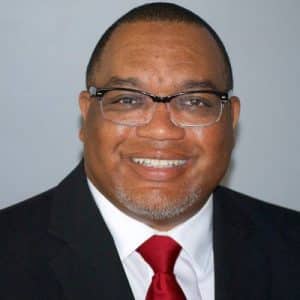 How would you describe the concept of ethnic matching and its importance to student learning?
How would you describe the concept of ethnic matching and its importance to student learning?
What ethnic matching initially suggests is that teachers of color can play a significant role in enhancing the academic experience of students of color. As this research and other research progress, findings have shown that teachers of color can play a significant role in also enhancing the academic experience of white students and can assist in enhancing a more culturally responsive profession as a whole. Therefore, the concept and research related to the concept suggest that we need to diversify teacher education. Mainly because as our communities are becoming more diverse, we are seeing our public schools also becoming more diverse. Yet what is happening is that our educator profession is not growing at a similar rate as these communities of students. The research around the concepts shows that perceived knowledge or knowledge from a preceptive culturally lens can play a role in students’ understanding of concepts, learning, and processing of information. This often can lead to these students being misinterpreted by teachers and feeling somehow misunderstood by teachers if they do not have that cultural lens to understand them. That is what teachers of color can bring to the table that can be of assistance to educational systems.
01 Jul2019
By Joanna Masingila
The journal of the New York Association of Colleges for Teacher Education, 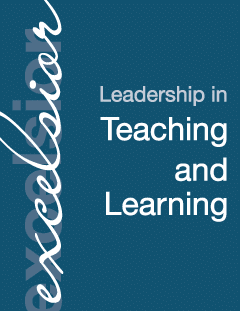 , has successfully navigated from a print journal with a subscription price to an online, open access journal that is free. Our new co-editors, Christine Ashby and Julia White have just published their first issue. The journal welcomes submissions from all interested teacher and leader educators.
, has successfully navigated from a print journal with a subscription price to an online, open access journal that is free. Our new co-editors, Christine Ashby and Julia White have just published their first issue. The journal welcomes submissions from all interested teacher and leader educators.
Excelsior is the key outlet for publishing work in teacher preparation for the New York Association of Colleges for Teacher Education. For over a decade, it has reported research across content disciplines, research methodologies, theoretical perspectives, and current issues in the field.
In addition to presenting authors the opportunity to publish in an open access journal, we want to increase the diversity of manuscript topics, including the diversity of research methods, and extend the range of researchers and practitioners publishing in Excelsior. To meet this goal we will routinely solicit submissions from:
28 Jun2019
By Jerrica Thurman
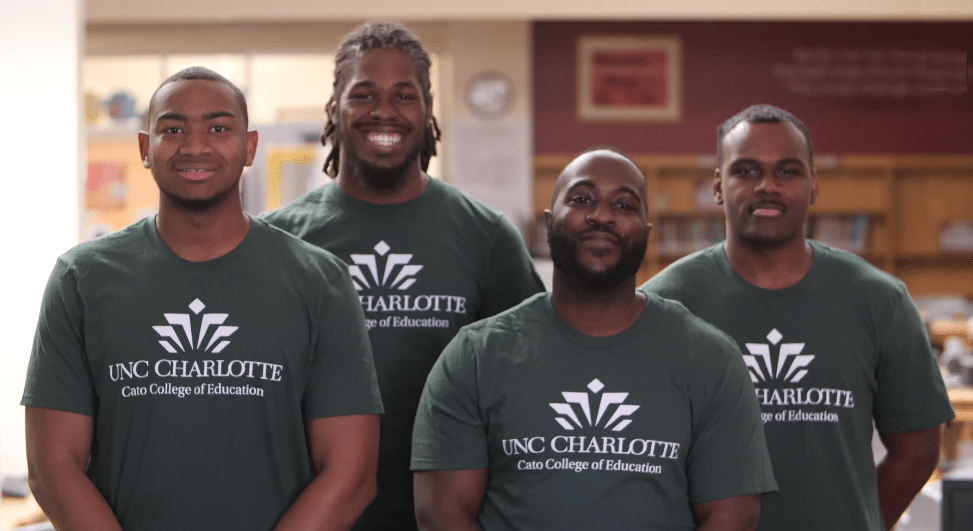
AACTE member institution Cato College of Education at the University of North Carolina at Charlotte (UNCC) works to create effective solutions to the shortage of Black male teachers. Thomas Fisher, supervisor of student teaching in the Office of School and Community Partnerships, recruited four of his former students to help implement a program to engage and recruit Black male students into the teaching profession. The team visits schools and shares their story to inspire a new generation of educators in the most underrepresented demographic in teaching.
“There’s only 2% Black male teachers in the United States,” says Timothy Wells, social studies teacher at Ridge Road Middle School, who is featured in the “What’s Your Impact?” video. “Studies show that your success increases if you have a Black male teacher or a male teacher in general from an early age.” The video spotlights Black male graduates of UNC’s Cato College of Education as they share why they pursued a teaching career. It also includes Edwin Campbell, American history teacher at Vance High School; Devin Murphy, math teacher at Myers Park High School; and Dwayne Simmons, English teacher and dean of students at Quail Hollow Middle School. Please take a few minutes to watch the video above to hear the dynamic stories of these educators.
28 Jun2019
By Brandon R.T. Frost
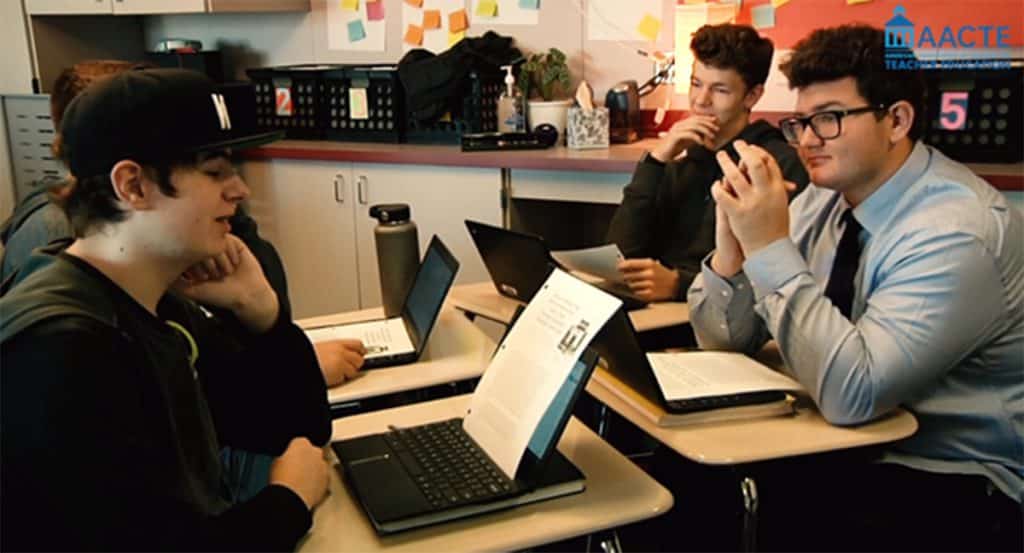
Empowering teachers to feel adequately prepared on their first day of teaching is the goal of Portland State University’s (PSU) Secondary Dual Education Program (SPED). As classrooms becomes more diverse, teachers need skills to address all students’ needs and make every student feel they are included in a positive community.
Andrew Gilford, assistant principal at Clackamas High School, believes the training and preparation his teachers receive from SPED enables them to meet the needs of all their students in the classroom. The program requires all teacher candidates to have two years of practice before entering the classroom. In particular, during the two years candidates engage in a combination of observation and student teaching. Michael Bowersox agrees that the two-year program allowed him to combine his coursework at PSU with classroom practice so that he is ready to be an effective teacher on the very first day as a teacher of record. Teacher candidates are matched with master teachers, learn to plan together, and develop the teaching skills to positively affect student achievement for all.
The highlight of PSU’s Dual Degree program is the training it provides its teacher candidates to be inclusive educators. “A characteristic of a successful classroom is the ability for everyone to feel included and have the opportunity to be included,” says Joseph Cornett, a graduate of PSU and a social studies teacher at David Douglas High School. He explains that the program taught him how to set up his students for success, work collaboratively with teachers, and navigate the school system and curriculum.
To learn more, view the video highlighting PSU’s Secondary Dual Education program, part of AACTE’s Research-to-Practice Spotlight Series.
28 Jun2019
By Katrina Norfleet
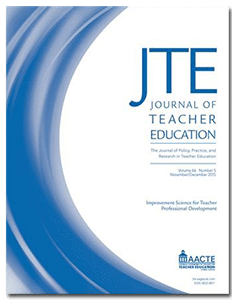 In the recently released 2019 Journal Citation Reports, AACTE’s Journal of Teacher Education (JTE) achieved a 2-year impact factor score of 3.263—indicating the average number of times any JTE article published in 2016 or 2017 was cited during 2018. The impact factor increased from JTE’s last score of 3.180, and keeps its ranking as 12th out of 238 journals worldwide in the “education and educational research” category.
In the recently released 2019 Journal Citation Reports, AACTE’s Journal of Teacher Education (JTE) achieved a 2-year impact factor score of 3.263—indicating the average number of times any JTE article published in 2016 or 2017 was cited during 2018. The impact factor increased from JTE’s last score of 3.180, and keeps its ranking as 12th out of 238 journals worldwide in the “education and educational research” category.
The journal, now in its 70th year of publication, is widely known for its high standard of quality and diverse perspectives on policy, practice, and research in teacher preparation. The number of citations of JTE articles in other journals provides a snapshot of its significance to the profession.
This high ranking is also a reflection of the scholarly rigor assured by the editors and peer reviewers. Michigan State University’s (MSU) College of Education currently serves as the editorial host of the AACTE flagship journal. MSU completed its first 3-year term as editorial host in 2018, and will continue to lead the editorial process through 2021. As of July 1, 2018, the coeditors are Tonya Bartell, Dorinda Carter Andrews, Robert Floden, and Gail Richmond, all from MSU.
One of the fundamental goals of the journal is the use of evidence from rigorous investigation to identify and address the increasingly complex issues confronting teacher development at the national and global levels. Thanks to the MSU editorial team and publishing partners at SAGE, a number of global perspectives factor into the journal. These include the translation and posting of article abstracts online in Spanish, German, and Mandarin; the high number of submissions—nearly half—from outside the United States; and the thousands of subscribers who read the journal through SAGE’s “developing world” initiatives.
To learn more about the journal and its current editorial team, visit aacte.org. AACTE members can also access JTE content online via the page’s “AACTE Member Free JTE Access” button—including the complete archive dating back to 1950 as well as prepublication articles in the SAGE Online First system.
27 Jun2019
By Azaria Cunningham
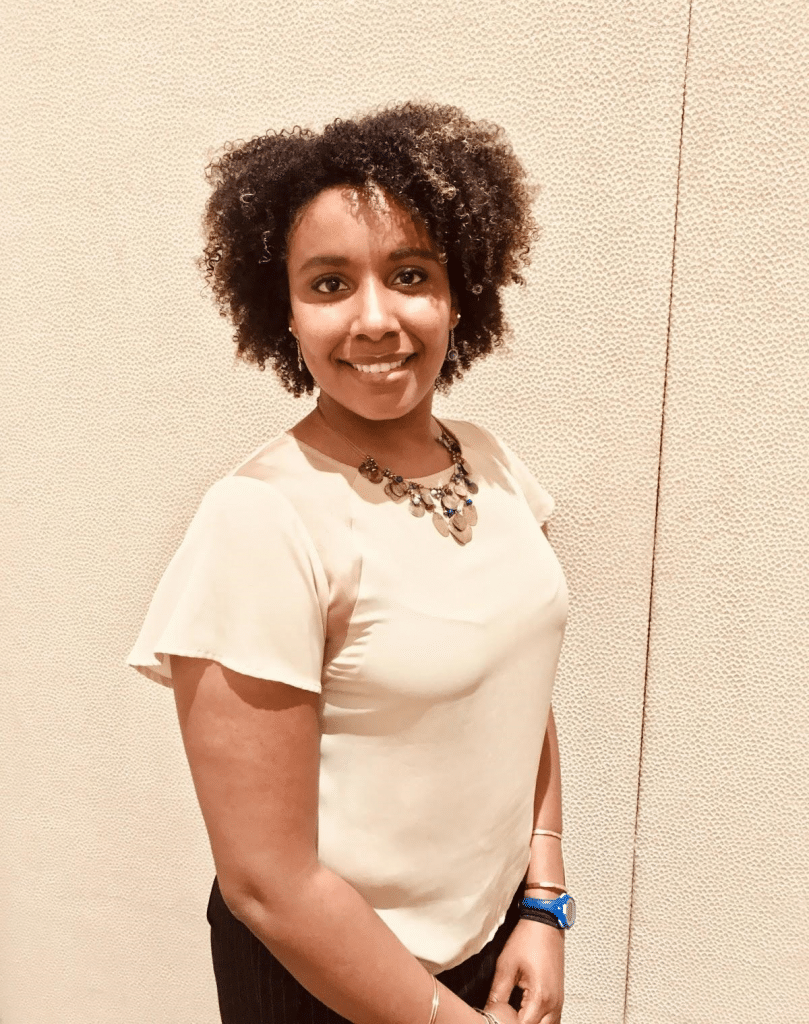 Congratulations to Dana Dunwoody, Holmes Scholar of the Month for June 2019! Dunwoody recently completed her dissertation defense at Boston University and will graduate in September 2019. Her dissertation research examines “Practicing Critical Coaching: Disrupting traditional youth sport coaching with social justice and critical consciousness.”
Congratulations to Dana Dunwoody, Holmes Scholar of the Month for June 2019! Dunwoody recently completed her dissertation defense at Boston University and will graduate in September 2019. Her dissertation research examines “Practicing Critical Coaching: Disrupting traditional youth sport coaching with social justice and critical consciousness.”
Dunwoody served as the Holmes national president from 2017–2019, and implemented many positive changes during her tenure. Prior to that, she served as Holmes Scholars sergeant-at-arms (2016-2017), and organized and planned many conferences for the Holmes community as well as her institution.
Her service also includes her work with Ultimate Peace, where she facilitated discussions with leaders in training Middle East program directors on redesigning the curriculum for youth leaders and coaches. In this role, she has led discussions with Middle East staff on the implementation of cross-cultural equity, diversity, and inclusion within coaching programs.
Upon graduation, Dunwoody plans to continue her career at Boston University with the Associate Provost’s Office of Professional Development & Postdoctoral Affairs. In her upcoming position, she will work collaboratively with a team of associate provosts, postdoctoral associates, and graduate assistants across two universities: Boston University and Northwestern University.
27 Jun2019
By North Carolina State College of Education

The NC State College of Education and The Innovation Project have selected 19 N.C. High School Mathematics Master Teaching Fellows.
Supported by a five-year, $1.8 million grant from the National Science Foundation, this program will prepare, support and retain master teachers of mathematics from high-needs school districts across the state of North Carolina, and is a partnership between the NC State College of Education, The Innovation Project and seven school districts where the 19 fellows come from:
27 Jun2019
By Lynn M. Gangone

This article by President and CEO Lynn M. Gangone was originally published in the “Empowering Our Educators” supplement to USA Today and on the Education and Career News website. The article and photo are reprinted with permission.
Effective educators are developed, not born. Their preparation begins in colleges and schools of education and persists through the professional development during their careers. As the needs of student learners evolve, so too must our development of educators.
25 Jun2019
By The Virgin Islands Consortium
This article and photo originally appeared in The Virgin Islands Consortium and is reprinted with permission.
The University of the Virgin Islands on Monday launched an Inclusive Childcare Laboratory and Diagnostic Center on the St. Thomas Campus. According a release the institution of higher learning issued, the new facility is intended to enhance the educational experience of preservice teachers who will be supervised by professors as part of their studies—while supporting the university’s students and employees to better manage the challenges of balancing parenthood and college life. UVI will be among the first Historically Black Colleges and Universities to provide this service.
The establishment of a research-based childcare program linked to early childhood and the School of Education has been a goal of UVI President David Hall’s since 2014. “This idea has evolved over the years and it’s no longer just a place to care for our students’ children, but an opportunity to create a model early education center that can help enhance the quality of early childhood education throughout the Virgin Islands,” Mr. Hall said. “The significance of this project is now more transformative than our students imagined.”
As many as 30 children can be admitted at the center at a time. The center is open for children between ages two to eleven. Initially, the center will be operational from 3 p.m. to 10 p.m. However, it is expected to evolve from an after school to full-day childcare center, according to the university.
The idea for the childcare center arose from a survey of UVI students, staff and faculty who emphasized the need for such a facility on campus. “The University’s ability to address this critical need indicates that we listen to our students and we strive to address their needs,” Mr. Hall said.
25 Jun2019
By Lynn M. Gangone
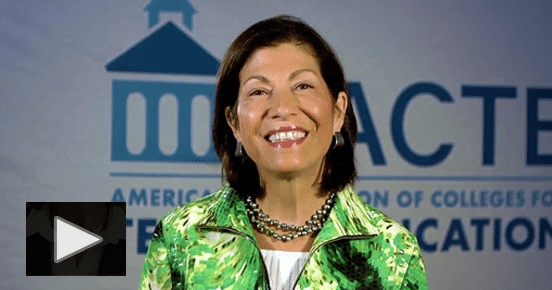
This month, AACTE members, colleagues, and students converged on our nation’s capital and made their voices heard during AACTE’s Washington Week events. From increasing teacher diversity to a renewed respect for the profession, attendees promoted educator preparation and pushed for their representatives’ support in making education the center of American values. Please take a few minutes to watch the video above (or read the transcript) to receive an update on AACTE’s advocacy efforts on your behalf.
Rest assured, AACTE tackles policy issues not only during our annual advocacy week but also throughout the year to continually move forward our legislative agenda. Stay connected to AACTE for up-to-the-minute information on policies and legislation by visiting aacte.org.



















